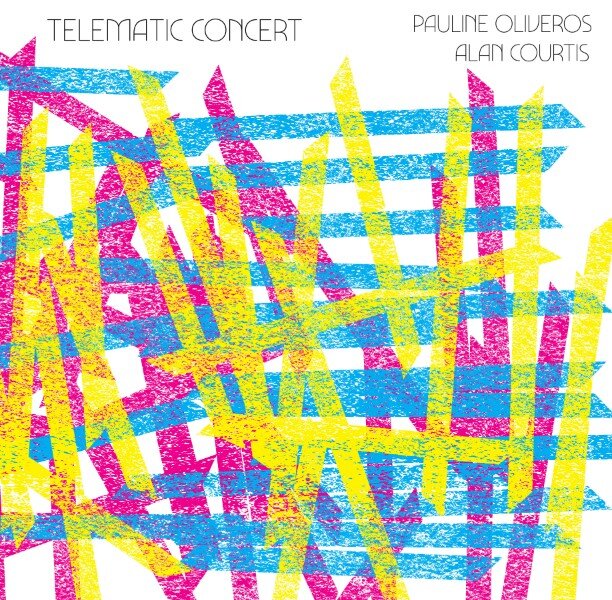Pauline Oliveros and Alan Courtis
Telematic Concert
SCORE: 7.5 out of 10
Published 10 years after it took place, Telematic Concert documents a live collaboration between two unusual individuals in a setting that was highly unusual as well: Pauline playing her accordion in New York while Courtis manipulated electronics and played guitar all the way back in Buenos Aires.
Buenos Aires, 1992: Composer, music philosopher and all around genre-breaking pioneer, Pauline Oliveros, met some members of one of the most singular LatinAmerican acts the world has never heard, while giving one of her famous, and essential, Deep Listening workshops. As guitarist Alan Courtis recalls it: “I remember an exercise called ‘Angels And Demons’, in which all the participants walked around casting out demons and angels through their voices. The room was full of sounding presences. This inspiring experience was the starting point of a friendship that has been going on ever since.”
Due to Pauline’s keen sense of curiosity and -an insatiable- need to explore new sounds, this bond was not kept exclusively emotional and, thankfully, it did result in two musical collaborations: the first one in 1999, an intervention on a recording from Pauline’s solo workshop-closing presentation in Buenos Aires; the second one, was an improvised live collaboration in 2009 with Courtis which is finally seeing the light of day thanks to the Spleen Coffin label.
Published 10 years after it took place, Telematic Concert documents a live collaboration between two unusual individuals in a setting no less unusual than the people interacting in it: While Oliveros played her amplified accordion inside the premises of the Deep Listening Institute in Kingston, NY, Courtis was responding from the comfort of his own home back in Buenos Aires. This setting may feel familiar by now, but in 2009 it wasn’t that common for live collaborations not to be face-to-face, and it was even less frequent to have the participants be in different countries while playing. Both Oliveros and Courtis had little to no preoccupations regarding the limitations of the streaming technology back then, and even with considerable lag, this Telematic Concert feels fluid and connected. Such was the commitment to keep this album as faithful to how it originally went down, that we can even hear people coughing.
Pauline breaks away from the more sublime and meditative side her work has been known for, instead treating us to heavy sonic assaults emanating from her accordion, which get an extra push from Alan’s bursts of percussive frenzy through the use of various objects. There’s an extreme use of dissonant overtones that still invite the listener to a state of introspection, but it’s not one without its obstacles. When it reaches its highest cacophonic moments, this endeavor feels like the soundtrack to an old expressionist film, and the scene we’re supposed to be watching is an utter -albeit beautiful- mess (in the best sense of the word).
Both players really feed off each other with seamless synchronicity even at its noisiest, but when they really shine is when they take things to a more subdued realm. The second track works as the calm after a tempestuous storm, creating a state of suspense, as if the story we’re being told had been presented backwards, showing us the end result right at the beginning and now we’re witnessing the events that led up to that frightening crescendo in the first track. Pauline’s accordion drones in the low end and explodes in the high end of its range, creating feedback that travels through the room, engulfing everything that’s inside; Courtis electronic manipulations create a contrast to Pauline’s stoicism, with vibrant textures that bounce trough the space created by those elongated notes.
To unfamiliar or casual listeners, what’s presented here may not have any sort of emotional impact, and for people with a very superficial knowledge of experimental music, this improvised session may lack any sort of excitement or sense of innovation; however, let’s keep in mind that Pauline is one of the pioneers of these type of musical exercises and they sound they way they do precisely because of her input. That being said, it would be understandable for someone to dismiss this as just another improvisational exercise on Olivero’s catalog, but its highs do outbalance the lows. In the grand scheme of things, the dynamic achieved by Courtis and Pauline may not have resulted in a hallmark effort, but it is still a grandiose and enthralling experience, and we couldn’t have expected less from these two highly idiosyncratic characters.





